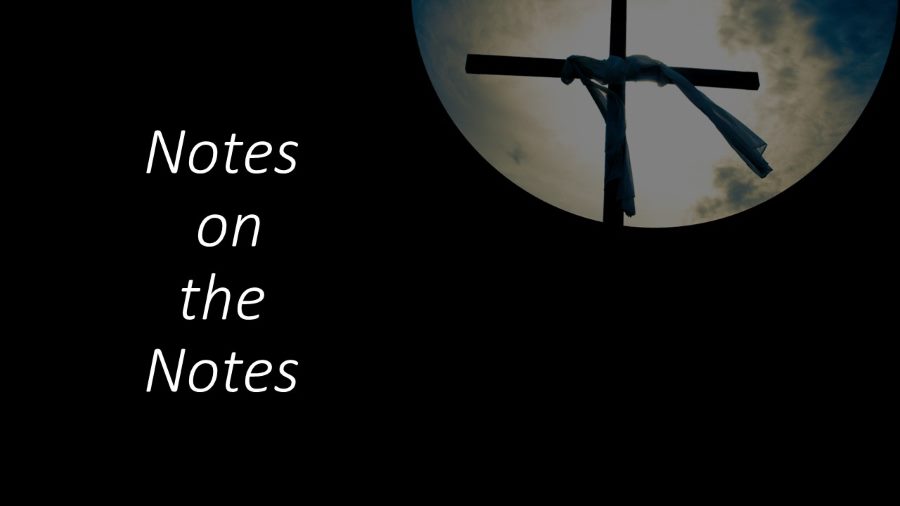Notes on the Notes – April 7, 2023

Good Friday
Service music:
The Good Friday music will be sung as a response to the scripture readings and reflections on the burdens represented. You are invited to use the words of the songs in a time of prayer, reading them aloud and reflecting on them.
“I Come to the Cross”
“I come to the cross seeking mercy and grace.
I come to the cross where You died in my place.
Out of my weakness and into Your strength,
Humbly, I come to the cross.
Your arms are open, You call me by name.
You welcome this child that was lost.
You paid the price for my guilt and my shame.
Jesus, I come, Jesus, I come,
Jesus, I come to the cross.”
As we begin our Good Friday service, we open ourselves to be present during this time of worship. The song was written by Bob Somma and Bill Batstone (1996).
“God Will Embrace” (VU #286 v 2)
“God will embrace your pain and weeping,
Your helpless anger and distress.
If you are in God’s care and keeping,
In sorrow will God love you less?
For Christ who took for you a cross,
Will bring you safe through every loss.”
These words come from the hymn “If You Will Trust in God to Guide You,” originally by Georg Neumark (1641), with this verse translated to English by Jaroslav J. Vajda (1978). As we reflect on the burden of anger, past and present, we are assured that God walks with us.
“When We Are Tempted to Deny Your Son” (VU #119 v 1)
“When we are tempted to deny your Son;
Because we fear the anger of the world,
And we are few who hear the insults hurled,
Your will, O God, be done.”
The lyrics of this hymn bring the denial of Jesus from the ancient past, when Peter denied Jesus three times, to the present day and our own struggles with following Jesus. We will be using the first verse as we reflect on the burden of anger. The words of the hymn are a prayer for God’s will to be done, even in the discomfort of anger. Daniel W. Romig wrote the words for this hymn in 1965. It was first published in an American Presbyterian hymnal known as The Worship Book (1972). The melody, FAITH, is by J. Harold Moyer (1965).
“When We are Tempted to Barter Our Souls” (MV #65 v 3)
“When we are tempted to barter our souls,
Trading the truth for the power to control,
Teach us to worship and praise only you,
Seeking your will in the work that we do.”
The hymn “When We are Tested” comes to us from Ruth Duck (1996). It is rooted in the temptations and struggles of Jesus in the wilderness before he started his ministry. This lament asks God to be with us, even in the most extreme of circumstances. We will be singing the third verse as we reflect on the burden of power.
“The Darkest Mystery is Here” (VU #495 v 3)
“That darkest mystery is here,
Sorrow and pity, anger, fear;
Conquer once more, dear Lord, death’s sting;
Faith, trust, and consolation bring.”
We will be using the third verse of the hymn “Lord of All Love” as we reflect on the burden of grief. The words are a prayer to Jesus to bring us faith, trust and consolation, even in the midst of grief. The hymn was written by Colin Gibson in 1987. We will be using the hymn tune HESPERUS (QUEBEC), written by Henry Baker in 1854.
“May Pain Draw Forth Compassion” (MV #73 v 5)
“May pain draw forth compassion,
Let wisdom rise from loss.
O take my heart and fashion the image of your cross.
Then may I know your healing through healing that I share,
Your grace and love revealing your tenderness and care.”
These lyrics by Marty Haugen (2003) are from the hymn “O God, Why are You Silent.” The words are set to the beloved PASSION CHORALE, written by Hans Leo Hassler (1601) and harmonized by Johann Sebastian Bach (1729). As we reflect on the burden of regret, the lyrics give voice to the struggle to remain faithful to God when presented with the choices between the ease and safety of going with the crowd as contrasted to having the faith and courage needed to stay true to what we believe is right. We ask God to work through us to bring healing, both to ourselves and others, and that we may show God’s love and grace through our actions.
“Burdens are Lifted at Calvary”
“Days are filled with sorrow and care,
Hearts are lonely and drear;
Burdens are lifted at Calvary,
Jesus is very near.
Burdens are lifted at Calvary, Calvary, Calvary;
Burdens are lifted at Calvary, Jesus is very near.
Cast your care on Jesus today,
Leave your worry and fear;
Burdens are lifted at Calvary,
Jesus is very near.
Burdens are lifted at Calvary, Calvary, Calvary;
Burdens are lifted at Calvary, Jesus is very near.
Troubled soul, the Savior can see every heartache and tear;
Burdens are lifted at Calvary,
Jesus is very near.
Burdens are lifted at Calvary, Calvary, Calvary;
Burdens are lifted at Calvary, Jesus is very near.
Jesus is very near.
Jesus is very near.
He’s very near.”
Our closing anthem was written in 1952 by John M. Moore and was arranged by Camp Kirkland in 2004. Even in the midst of our many human burdens, we know that Jesus is always near. The lyrics were inspired by Romans 5:8 –
“But God demonstrates His own love toward us,
in that while we were yet sinners,
Christ died for us.”
Categories: Notes on the Notes

